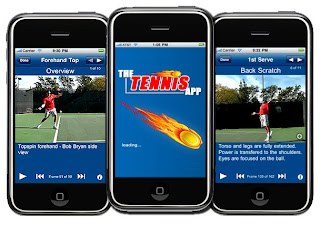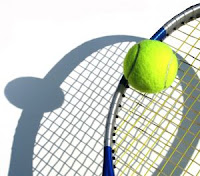I am working with a mental sports coach to improve my tennis game.
That's right. Me. The person who is not a serious athlete. Me. The player who is more concerned with how cute her skirt looks than with how deep her volley goes. Me. The person who does not believe in "affirmations" or "visualizations" or taking deep breathes on a regular basis. Yes, I am getting mental coaching from someone who helps professional athletes gain the psychological edge they need to not only improve in their sport, but to excel. Even I can't believe it. And here's the weirdest part - I think it's working!
So how did this happen?
Well, I am a member of Team 4all, a group of women athlete bloggers put together by fitness apparel company 4all by jofit. The big golfer in the group is Kirsten Lewis who blogs about her experience at Kirsten's Awesome Quest. Since I have somewhat promised that I will get on this golf thing to please my husband, I have kept up with Kirsten and her blog and - guess what? - golfers are just as obsessive about their game as tennis players.
The other thing Kirsten does is provide mental coaching to athletes. She has a web site dedicated to this - Accessing The Awesomeness of You. And, lucky for me, she recently put together a group of several athletes to show just what mental coaching can do for athletes from all sports and at all levels of proficiency. When she approached me about working with her because she wanted to include a tennis player, I said yes, thinking I was just being nice to my fellow Team 4all member but honestly, I probably wouldn't get much out of it.
Of course, I was wrong.
Why? Because tennis is such a mental game! You know that and I know that (I just checked - I have 29 posts tagged "psychology"). So naturally, anything I can do to strengthen the mental aspect of my play is bound to help my game as a whole.
Here is what my mental coaching experience has been like so far: I have had two phone conversations with Kirsten. Each lasted about an hour. And I can honestly say, after each one, I really had a new view of what is possible for me as a tennis player. Kirsten was able to draw out from me what I see as my current limitations in my game - things I hadn't articulated for myself but knew were true as soon as I said them to her.
She gave me several affirmative questions to think about. Not to answer. Just to think about. One of them is: "What have I decided is not possible that truly is possible? And what is possible after that?" Sounds hokey, right? But by thinking on this (and a few other questions) for a week, I was able to come up with some new goals for myself that I would never have previously even considered (singles anyone?).
Without boring you with my personal details, I can tell you that, in just the few hours I have spent being "coached" by Kirsten, I have come to appreciate how sports psychology and mental coaching can help any athlete of any skill level. And I have another session coming in about a week and I am actually looking forward to it!
Are you ready for a mental coach? Well, maybe you're not quite ready to go out and hire someone to help you with this aspect of your tennis game. But don't pass up this opportunity for quick improvement. Check out these resources that I've used for some quick, easy, no-cost mental help:
- Accessing the Awesomeness of You: Extraordinary Results in Athletics and Life - Found at www.awesomenessofyou.com, this is Kirsten's mental coaching site. She also has a blog here and you can sign up to get her free newsletter.
- Sports Psychology For Tennis- Found at www.sportspsychologytennis.com, this web site is run by sports psychologist Dr. Patrick Cohn and is focused on mental coaching for tennis players. He also has a fabulous podcast called "Tennis Psychology Podcast" that you can download from iTunes or from his web site.
© Kim Selzman 2011 All Rights Reserved














